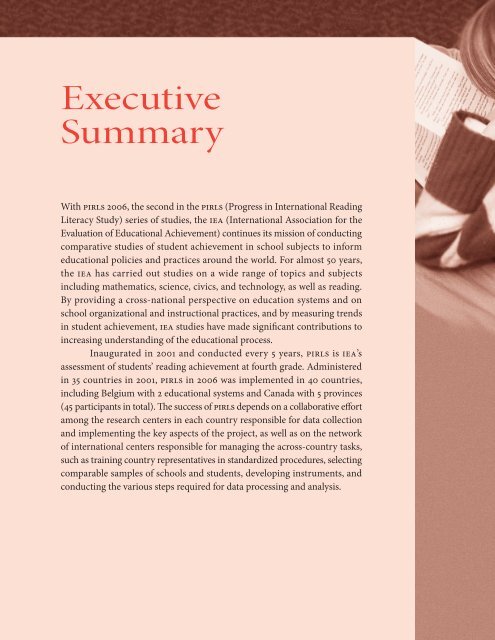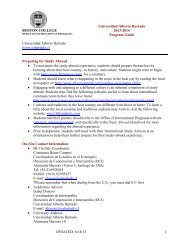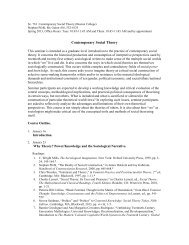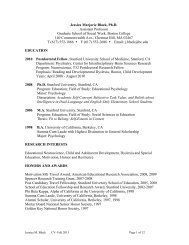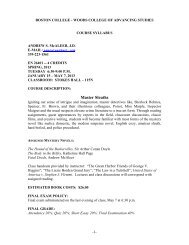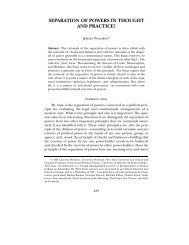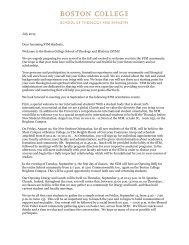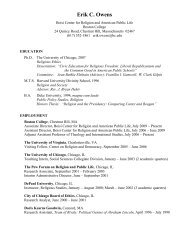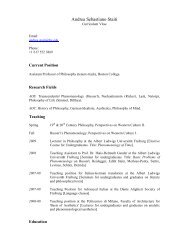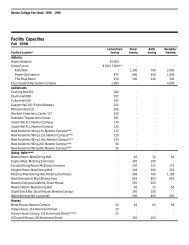- Page 3 and 4: PIRLS 2006 International Report IEA
- Page 5 and 6: Contents Executive Summary 1 Introd
- Page 7 and 8: Chapter 3 105 Literacy-related Acti
- Page 9 and 10: Exhibit 6.16 Students Answer Questi
- Page 11: Appendix C 327 Percentiles and Stan
- Page 15 and 16: executive summary ▶ ▶ ▶ ▶
- Page 17 and 18: executive summary the Russian Feder
- Page 19 and 20: executive summary ▶ ▶ On averag
- Page 21 and 22: executive summary reading instructi
- Page 23 and 24: executive summary ▶ In PIRLS 2006
- Page 27 and 28: Introduction In today’s informati
- Page 29 and 30: introduction assessment, and to col
- Page 31 and 32: introduction However, eventually th
- Page 33 and 34: introduction complete the PIRLS 200
- Page 35 and 36: introduction Exhibit Countries Part
- Page 37 and 38: introduction The economic indicator
- Page 39 and 40: introduction Exhibit 2: Selected 2
- Page 41 and 42: introduction the case for most coun
- Page 43 and 44: introduction Exhibit 3: 3 Informati
- Page 47 and 48: Chapter 1 International Student Ach
- Page 49 and 50: chapter 1: international student ac
- Page 51 and 52: chapter 1: international student ac
- Page 53 and 54: chapter 1: international student ac
- Page 55 and 56: chapter 1: international student ac
- Page 57 and 58: chapter 1: international student ac
- Page 59 and 60: chapter 1: international student ac
- Page 61 and 62: chapter 1: international student ac
- Page 63 and 64:
chapter 1: international student ac
- Page 65 and 66:
chapter 1: international student ac
- Page 67 and 68:
chapter 1: international student ac
- Page 69 and 70:
chapter 1: international student ac
- Page 71 and 72:
chapter 1: international student ac
- Page 73 and 74:
chapter 1: international student ac
- Page 75 and 76:
chapter 1: international student ac
- Page 79 and 80:
Chapter 2 Performance at the PIRLS
- Page 81 and 82:
chapter 2: performance at internati
- Page 83 and 84:
chapter 2: performance at internati
- Page 85 and 86:
chapter 2: performance at internati
- Page 87 and 88:
chapter 2: performance at internati
- Page 89 and 90:
chapter 2: performance at internati
- Page 91 and 92:
chapter 2: performance at internati
- Page 93 and 94:
chapter 2: performance at internati
- Page 95 and 96:
chapter 2: performance at internati
- Page 97 and 98:
chapter 2: performance at internati
- Page 99 and 100:
chapter 2: performance at internati
- Page 101 and 102:
chapter 2: performance at internati
- Page 103 and 104:
chapter 2: performance at internati
- Page 105 and 106:
chapter 2: performance at internati
- Page 107 and 108:
chapter 2: performance at internati
- Page 109 and 110:
chapter 2: performance at internati
- Page 111 and 112:
chapter 2: performance at internati
- Page 113 and 114:
chapter 2: performance at internati
- Page 115:
chapter 2: performance at internati
- Page 118 and 119:
106 chapter 3: literacy-related act
- Page 120 and 121:
108 chapter 3: literacy-related act
- Page 122 and 123:
110 chapter 3: literacy-related act
- Page 124 and 125:
112 chapter 3: literacy-related act
- Page 126 and 127:
114 chapter 3: literacy-related act
- Page 128 and 129:
116 chapter 3: literacy-related act
- Page 130 and 131:
118 chapter 3: literacy-related act
- Page 132 and 133:
120 chapter 3: literacy-related act
- Page 134 and 135:
122 chapter 3: literacy-related act
- Page 136 and 137:
124 chapter 3: literacy-related act
- Page 138 and 139:
126 chapter 3: literacy-related act
- Page 140 and 141:
128 chapter 3: literacy-related act
- Page 142 and 143:
130 chapter 3: literacy-related act
- Page 144 and 145:
132 chapter 3: literacy-related act
- Page 146 and 147:
134 chapter 3: literacy-related act
- Page 148:
136 chapter 3: literacy-related act
- Page 152 and 153:
140 chapter 4: students’ reading
- Page 154 and 155:
142 chapter 4: students’ reading
- Page 156 and 157:
144 chapter 4: students’ reading
- Page 158 and 159:
146 chapter 4: students’ reading
- Page 160 and 161:
148 chapter 4: students’ reading
- Page 162 and 163:
150 chapter 4: students’ reading
- Page 164 and 165:
152 chapter 4: students’ reading
- Page 166 and 167:
154 chapter 4: students’ reading
- Page 169 and 170:
Chapter 4 Students’ Reading Attit
- Page 171 and 172:
chapter 4: students’ reading atti
- Page 173 and 174:
chapter 4: students’ reading atti
- Page 175 and 176:
chapter 4: students’ reading atti
- Page 177 and 178:
chapter 4: students’ reading atti
- Page 179 and 180:
chapter 4: students’ reading atti
- Page 181 and 182:
chapter 4: students’ reading atti
- Page 183 and 184:
chapter 4: students’ reading atti
- Page 185:
chapter 4: students’ reading atti
- Page 188 and 189:
158 chapter 5: school curriculum an
- Page 190 and 191:
160 chapter 5: school curriculum an
- Page 192 and 193:
162 chapter 5: school curriculum an
- Page 194 and 195:
164 chapter 5: school curriculum an
- Page 196 and 197:
166 chapter 5: school curriculum an
- Page 198 and 199:
168 chapter 5: school curriculum an
- Page 200 and 201:
170 chapter 5: school curriculum an
- Page 202 and 203:
172 chapter 5: school curriculum an
- Page 204 and 205:
174 chapter 5: school curriculum an
- Page 206 and 207:
176 chapter 5: school curriculum an
- Page 208 and 209:
178 chapter 5: school curriculum an
- Page 210 and 211:
180 chapter 5: school curriculum an
- Page 212 and 213:
182 chapter 5: school curriculum an
- Page 214 and 215:
184 chapter 5: school curriculum an
- Page 216 and 217:
186 chapter 5: school curriculum an
- Page 218 and 219:
188 chapter 5: school curriculum an
- Page 220 and 221:
190 chapter 5: school curriculum an
- Page 222 and 223:
192 chapter 5: school curriculum an
- Page 225 and 226:
Chapter 6 Teachers and Reading Inst
- Page 227 and 228:
chapter 6: teachers and reading ins
- Page 229 and 230:
chapter 6: teachers and reading ins
- Page 231 and 232:
chapter 6: teachers and reading ins
- Page 233 and 234:
chapter 6: teachers and reading ins
- Page 235 and 236:
chapter 6: teachers and reading ins
- Page 237 and 238:
chapter 6: teachers and reading ins
- Page 239 and 240:
chapter 6: teachers and reading ins
- Page 241 and 242:
chapter 6: teachers and reading ins
- Page 243 and 244:
chapter 6: teachers and reading ins
- Page 245 and 246:
chapter 6: teachers and reading ins
- Page 247 and 248:
chapter 6: teachers and reading ins
- Page 249 and 250:
chapter 6: teachers and reading ins
- Page 251 and 252:
chapter 6: teachers and reading ins
- Page 253 and 254:
chapter 6: teachers and reading ins
- Page 255 and 256:
chapter 6: teachers and reading ins
- Page 257 and 258:
chapter 6: teachers and reading ins
- Page 259 and 260:
chapter 6: teachers and reading ins
- Page 261 and 262:
chapter 6: teachers and reading ins
- Page 263 and 264:
chapter 6: teachers and reading ins
- Page 265 and 266:
chapter 6: teachers and reading ins
- Page 267 and 268:
chapter 6: teachers and reading ins
- Page 269 and 270:
chapter 6: teachers and reading ins
- Page 271 and 272:
chapter 6: teachers and reading ins
- Page 275 and 276:
Chapter 7 School Contexts While the
- Page 277 and 278:
chapter 7: school contexts ▶ ▶
- Page 279 and 280:
chapter 7: school contexts Exhibit
- Page 281 and 282:
chapter 7: school contexts Exhibit
- Page 283 and 284:
chapter 7: school contexts Exhibit
- Page 285 and 286:
chapter 7: school contexts in quali
- Page 287 and 288:
chapter 7: school contexts Several
- Page 289 and 290:
chapter 7: school contexts Exhibit
- Page 291 and 292:
chapter 7: school contexts Exhibit
- Page 293 and 294:
chapter 7: school contexts letters
- Page 295 and 296:
chapter 7: school contexts Exhibit
- Page 297 and 298:
chapter 7: school contexts Exhibit
- Page 299 and 300:
chapter 7: school contexts Exhibit
- Page 301 and 302:
chapter 7: school contexts Exhibit
- Page 303 and 304:
chapter 7: school contexts Exhibit
- Page 305 and 306:
chapter 7: school contexts On avera
- Page 307 and 308:
chapter 7: school contexts Exhibit
- Page 309:
chapter 7: school contexts Exhibit
- Page 312 and 313:
282 appendix a: overview of pirls 2
- Page 314 and 315:
284 appendix a: overview of pirls 2
- Page 316 and 317:
286 appendix a: overview of pirls 2
- Page 318 and 319:
288 appendix a: overview of pirls 2
- Page 320 and 321:
290 appendix a: overview of pirls 2
- Page 322 and 323:
292 appendix a: overview of pirls 2
- Page 324 and 325:
294 appendix a: overview of pirls 2
- Page 326 and 327:
296 appendix a: overview of pirls 2
- Page 328 and 329:
298 appendix a: overview of pirls 2
- Page 330 and 331:
300 appendix a: overview of pirls 2
- Page 332 and 333:
302 appendix a: overview of pirls 2
- Page 334 and 335:
304 appendix a: overview of pirls 2
- Page 336 and 337:
306 appendix a: overview of pirls 2
- Page 338 and 339:
308 appendix a: overview of pirls 2
- Page 340 and 341:
310 appendix a: overview of pirls 2
- Page 342 and 343:
312 appendix a: overview of pirls 2
- Page 344:
314 appendix a: overview of pirls 2
- Page 348 and 349:
318 appendix b: multiple comparison
- Page 350 and 351:
320 appendix b: multiple comparison
- Page 352 and 353:
322 appendix b: multiple comparison
- Page 354 and 355:
324 appendix b: multiple comparison
- Page 357 and 358:
Appendix C Percentiles and Standard
- Page 359 and 360:
appendix c: percentiles and standar
- Page 361 and 362:
appendix c: percentiles and standar
- Page 363 and 364:
appendix c: percentiles and standar
- Page 365 and 366:
appendix c: percentiles and standar
- Page 367:
appendix c: percentiles and standar
- Page 370 and 371:
340 appendix d: sample passages, qu
- Page 372 and 373:
342 appendix d: sample passages, qu
- Page 374 and 375:
344 appendix d: sample passages, qu
- Page 376 and 377:
346 appendix d: sample passages, qu
- Page 378 and 379:
348 appendix d: sample passages, qu
- Page 380 and 381:
350 appendix d: sample passages, qu
- Page 382 and 383:
352 appendix d: sample passages, qu
- Page 384 and 385:
354 appendix d: sample passages, qu
- Page 386 and 387:
356 appendix d: sample passages, qu
- Page 388 and 389:
358 appendix d: sample passages, qu
- Page 390 and 391:
360 appendix d: sample passages, qu
- Page 392 and 393:
362 appendix d: sample passages, qu
- Page 394 and 395:
364 appendix d: sample passages, qu
- Page 396 and 397:
366 appendix d: sample passages, qu
- Page 398 and 399:
368 appendix d: sample passages, qu
- Page 400 and 401:
370 appendix d: sample passages, qu
- Page 402 and 403:
372 appendix d: sample passages, qu
- Page 404 and 405:
374 appendix d: sample passages, qu
- Page 406 and 407:
376 appendix d: sample passages, qu
- Page 408:
378 appendix d: sample passages, qu
- Page 412 and 413:
382 appendix e: reading items used
- Page 414 and 415:
384 appendix e: reading items used
- Page 416 and 417:
386 appendix e: reading items used
- Page 418 and 419:
388 appendix e: reading items used
- Page 420 and 421:
390 appendix e: reading items used
- Page 423 and 424:
Appendix F Iceland and Norway—Fif
- Page 425:
appendix f: iceland and norway - gr
- Page 428 and 429:
398 appendix g: organizations and i
- Page 430 and 431:
400 appendix g: organizations and i
- Page 432 and 433:
402 appendix g: organizations and i
- Page 434:
404 appendix g: organizations and i
- Page 437:
TIMSS & PIRLS International Study C
- Page 440 and 441:
TIMSS & PIRLS International Study C
- Page 442 and 443:
TIMSS & PIRLS International Study C
- Page 444 and 445:
TIMSS & PIRLS International Study C
- Page 447 and 448:
TIMSS & PIRLS International Study C
- Page 449 and 450:
TIMSS & PIRLS International Study C
- Page 451:
TIMSS & PIRLS International Study C
- Page 456:
TIMSS & PIRLS International Study C


